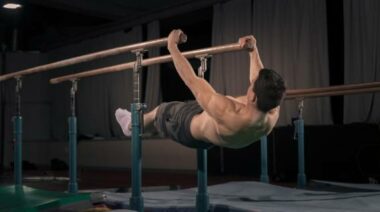Some of the most common questions coaches get from trainees are in regards to Delayed Onset Muscle Soreness (DOMS), the muscle pain you get following a workout. Of particular interest is how to make it more tolerable. A recent study1 in the Journal of Strength and Conditioning Research looked at whether or not caffeine could help keep DOMS under control.
The authors of the study explain that caffeine is an adenosine receptor antagonist, meaning that it assists in blocking the perception of pain. As such, they suspected on the outset of the research, that DOMS might be reduced by caffeine intake.
The 30 adult test subjects completed a 164 km recreational cycle ride to induce the soreness, primarily in the quads. They then ingested either 3 mg per kilogram of bodyweight or a placebo immediately after the ride, and each morning for the next four days. They consumed the same dose again in the afternoon for the next 3 afternoons. That amounts to about 1 large cup of coffee for a 150 lb (68 kg) person with each dose.
It’s worth noting that most people form an increased tolerance, and blunted effect from habitual use. In other words, the dose they took represented a lot of caffeine for someone who consumed no caffeine prior to the study, but not a huge dose for daily users, of which the test subjects were the latter. They consumed an average of 230 mg of caffeine daily already. Based on the average weight of the participants, those in the caffeine group consumed about double their normal dose total each day. Still, half a gram of caffeine daily is more than enough to cause sleep problems in many people.
After the study, both perceived soreness and perceived leg function (how strong their legs felt during daily tasks) were measured for the next few days to see if the caffeine affected either variable.
It may not be for everyone, but caffeine may provide some relief from DOMS.
The caffeine was actually effective as the researchers suspected, especially the first day after the race. Both function and soreness were reduced on that day. After that, perceived leg function was no different between the groups, but soreness did seem to be less in the afternoons for the next few days. So it would seem that caffeine can provide some pain relief.
Of particular importance to these results would be athletes who are participating in multi-day events. Soreness can affect the effort an athlete puts into subsequent efforts by making it unpleasant to continue. However, it’s important to note that soreness was reduced, but the feelings of leg function were not after the day following the exercise. For events lasting longer than two days, confidence could still be sapped, even with this regimen.
If you do plan on trying caffeine as a means of reducing post exercise pain, the researchers indicated that the effect is short-lived. Some of the other benefits of caffeine diminish after two to four hours. This suggests the pain attenuation probably only lasts about that long as well. The researchers propose that taking caffeine a few times through the day might be required to maintain effectiveness, although they are silent on the option of taking more caffeine in a single dose as a means of extending its effects.
When trying out the pain relieving effects of caffeine, note that the participants consumed most of the caffeine after the workout, not before as you might normally do. All of them did ingest a small amount (averaging 44 mg) during the ride. Also, bear in mind that if you’re already accustomed to consuming the doses used in this study (approximately half a gram of caffeine daily) it may no longer have this effect for you, and doubling it would be inadvisable. If you currently consume little or no caffeine, the effective dose in this study may be too much for you. Play with the dosage and err on the side of too little at first.
References:
1. Aaron Caldwell, et. al., “Effect of Caffeine on Perceived Soreness and Functionality following an Endurance Cycling Event,” Journal of Strength and Conditioning Research, 2016, DOI: 10.1519/JSC.0000000000001608






